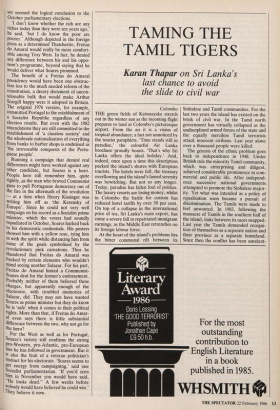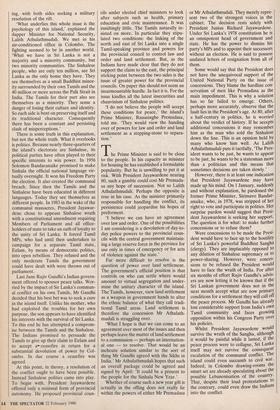TAMING THE TAMIL TIGERS
Karan Thapar on Sri Lanka's
last chance to avoid the slide to civil war
Colombo THE green fields of Katunayake stretch out in the winter sun as the incoming flight prepares to land at Colombo's picturesque airport. From the air it is a vision of tropical abundance; a fact not unnoticed by the tourist pamphlets. 'Time stands still in paradise,' the colourful Air Lanka brochure proudly boasts. 'That's why Sri Lanka offers the ideal holiday.' And, indeed, once upon a time this description packed the island's shores with European tourists. The hotels were full, the treasury overflowing and the island's famed serenity was bewitching. But not so any longer. Today, paradise has fallen foul of politics. The luxury resorts are losing money, whilst in Colombo the battle for custom has reduced hotel tariffs by over 50 per cent. On top of a collapse in the international price of tea, Sri Lanka's main export, has come a severe fall in repatriated immigrant earnings, as the Middle East retrenches on its foreign labour force.
At the heart of the island's problems lies the bitter communal rift between its Sinhalese and Tamil communities. For the last two years the island has existed on the brink of civil war. In the Tamil north government has virtually collapsed as the undisciplined armed forces of the state and the equally merciless Tamil terrorists attack innocent civilians. Last year alone over a thousand people were killed.
The genesis of the ethnic problem goes back to independence in 1948. Under British rule the minority Tamil community, which was enterprising and diligent, achieved considerable prominence in com- mercial and public life. After independ- ence successive national governments attempted to promote the Sinhalese major- ity. Yet what was intended as a policy of equalisation soon became a pursuit of discrimination. The Tamils were made to feel unwanted. In 1983, following the massacre of Tamils in the southern half of the island, links between its races snapped. Last year the Tamils demanded recogni- tion of themselves as a separate nation and their province as a separate homeland. Since then the conflict has been unrelent- ing, with both sides seeking a military resolution of the rift.
`What underlies this whole issue is the psychology of this island,' explained the dapper Minister for National Security, Lalith Athulathmudali. We met in his air-conditioned office in Colombo. The fighting seemed to be in another world. `What we have in Sri Lanka is not a majority and a minority .community, but two minority communities. The Sinhalese people, who are only ten million, see Sri Lanka as the only home they have. They see themselves as a small Buddhist minor- ity surrounded by their own Tamils and the 40 million or more across the Palk Strait in India. The Tamils for their part also see themselves as a minority. They sense a danger of losing their culture and identity. So each side is bent on preserving itself and its traditional character. Consequently there has been a constant and persisting clash of misperceptions.'
There is some truth in this explanation, but not the whole truth. What it overlooks is politics. Because nearly three-quarters of the island's electorate are Sinhalese, its political parties have often played to their specific interests to win power. In 1956 Solomon Bandaranaike promised to make Sinhala the official national language vir- tually overnight. It won his Freedom Party the election. It also created the communal breach. Since then the Tamils and the Sinhalese have been educated in different languages. Today they see themselves as different people. In 1983 in the wake of the communal massacres, President Jayawar- dene chose to appease Sinhalese wrath with a constitutional amendment requiring Members of Parliament and all office- holders of state to take an oath of loyalty to the unity of Sri Lanka. It forced Tamil MPs, who had until then undertaken to campaign for a separate Tamil state, Eelam, by means of democratic politics, into open rebellion. They refused and the only moderate Tamils the government could have dealt with were thrown out of parliament.
Last June Rajiv Gandhi's Indian govern- ment offered to sponsor peace talks. Wor- ried by the impact of Sir Lanka's commun- al conflict on his own Tamils, Mr Gandhi decided that his best bet was to seek a cure in the island itself. Unlike his mother, who had exploited the troubles for her own purpose, the son appears to have identified his interests with the survival of Sri Lanka. To this end he has attempted a comprom- ise between the Tamils and the Sinhalese. The Indians promised to persuade the Tamils to give up their claim to Eelam and to accept a—ceasefire in return for a substantial devolution of power by Col- ombo. In due course a ceasefire was agreed.
At this point, in theory, a resolution of the conflict ought to have been possible. Instead Sinhalese politics came into play. To begin with, President Jayawardene offered only a minimal form of provincial autonomy. He proposed provincial coun- cils under elected chief ministers to look after subjects such as health, primary education and civic maintenance. It was insultingly little. The Tamils naturally in- sisted on more. In particular they stipu- lated two conditions: the linking of the north and east of Sri Lanka into a single Tamil-speaking province and powers for the provincial council to control law and order and land settlement. But, as the Indians have made clear that they do not support the claim to the east, the principal sticking point between the two sides is the issue of greater power for the provincial councils. On paper this should not seem an insurmountable hurdle. In fact it is. For the issue kindles all the latest insecurities and chauvinism of Sinhalese politics.
`I do not believe the people will accept these conditions for peace,' the island's Prime Minister, Ranasinghe Premadasa, told me. 'They would view the handing over of powers for law and order and land settlement as a stepping-stone to separa- tion.'
The Prime Minister is said to be close to the people. In his capacity as minister for housing he has established a formidable popularity. But he is unwilling to put it at risk. With President Jayawardene nearing 80, such a gamble could cost Mr Premada- sa any hope of succession. Not so Lalith Athulathmudali. Perhaps the opposite is true in his case. As the minister primarily responsible for handling the conflict, its persistence could jeopardise his hopes of preferment.
`I believe we can have an agreement over law and order. One of the possibilities I am considering is a devolution of day-to- day police powers to the provincial coun- cils with the central government maintain- ing a large reserve force in the province for use only in times of emergency or for acts of violence against the state.'
Far more difficult to resolve is the question of power over land settlement. The government's official position is that controls on who can settle where would amount to virtual segregation and under- mine the unitary character of the island. The Tamils, however, view land settlement as a weapon in government hands to alter the ethnic balance of what they call tradi- tional Tamil areas. Land settlement is therefore the concession Mr Athulath- mudali is struggling over.
`What I hope is that we can come to an agreement over most of the issues and then perhaps leave the matter of land settlement to a commission — perhaps an internation- al one — to resolve. That would be an inchoate solution similar to the sort of thing Mr Gandhi agreed with the Sikhs in India.' Mr Athulathmudali hopes that such an overall package could be agreed and signed by April: 'It could be a present to the people for the Sinhala New Year.'
Whether of course such a new year gift is actually in the offing does not really lie within the powers of either Mr Premadasa or Mr Athulathmudali. They merely repre- sent two of the strongest voices in the cabinet. The decision rests solely with President Junius Richard Jayawardene. Under Sri Lanka's 1978 constitution he is an omnipotent head of government and state. He has the power to dismiss his party's MPs and to appoint their successors without an election. He is said to possess undated letters of resignation from all of them.
Some would say that the President does not have the unequivocal support of the United National Party on the issue of concessions. They blame the hardline con- servatism of men like Premadasa as the main impediment. This is why a solution has so far failed to emerge. Others, perhaps more accurately, observe that the fault lies in the President's age. At 80, after a half-century in politics, he is worried about the verdict of history. If he accepts additional concessions it may remember him as the man who sold the Sinhalese down the line. This is an opinion held by many who know him well. As Lalith Athulathmudali puts it tactfully, 'The Pres- ident wants to be just, he wants to appear to be just, he wants to be a statesman more than a politician and this means that sometimes decisions are taken slowly.'
However, there is at least one indication that President Jayawardene may have made up his mind. On 1 January, suddenly and without explanation, he pardoned the former Prime Minister, Sirimavo Bandar- anaike, who, in 1978, was stripped of her right to vote and participate in politics. Her surprise pardon would suggest that Presi- dent Jayawardene is seeking her support. The question is for what: to make further concessions or to refuse them?
Were concessions to be made the Presi- dent would have to face up to the hostility of Sri Lanka's powerful Buddhist Sangha (clergy). They are implacably opposed to any dilution of Sinhalese supremacy or to power-sharing. However, were conces- sions to be refused the President would have to face the wrath of India. For after six months of effort Rajiv Gandhi's advis- ers are now letting it be known that if the Sri Lankan government does not in the next month accept what are now primary conditions for a settlement they will call off the peace process. Mr Gandhi has already lost considerable support from India's own Tamil community and faces growing opposition within his Congress Party over his policies. Whilst President Jayawardene would survive the wrath of the Sangha, although it would be painful while it lasted, if the peace process were to collapse, Sri Lanka itself may not survive the consequent escalation of the communal conflict. The island could even succumb to civil war. Indeed, in Colombo drawing-rooms the smart set are already speculating about the possible Lebanonisation of the country• That, despite their loud protestations to the contrary, could even draw the Indians into the conflict.















































 Previous page
Previous page